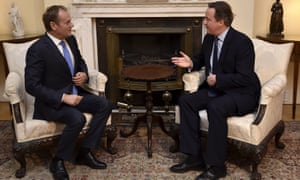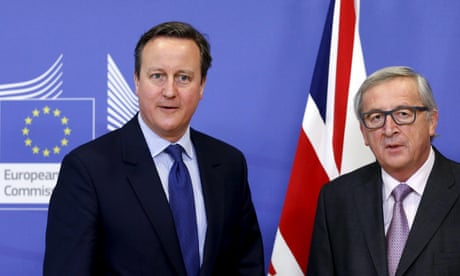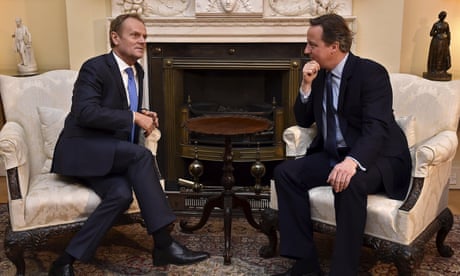PM and European council president fail to reach deal over renegotiation of Britain’s relationship with EU before crucial summit
 David Cameron and Donald Tusk meeting at No 10 to discuss the proposed ‘emergency brake’ on welfare payments for EU migrants. Photograph: Toby Melville/WPA Pool/Getty Images
David Cameron and Donald Tusk meeting at No 10 to discuss the proposed ‘emergency brake’ on welfare payments for EU migrants. Photograph: Toby Melville/WPA Pool/Getty Images
Rajeev Syal
 David Cameron and Donald Tusk meeting at No 10 to discuss the proposed ‘emergency brake’ on welfare payments for EU migrants. Photograph: Toby Melville/WPA Pool/Getty Images
David Cameron and Donald Tusk meeting at No 10 to discuss the proposed ‘emergency brake’ on welfare payments for EU migrants. Photograph: Toby Melville/WPA Pool/Getty Images Rajeev Syal
David Cameron’s preferred option of an early referendum on Britain’s membership of the EU edged further away after he failed to broker a deal with the president of the European council, Donald Tusk.
The two men had hoped to finalise a renegotiation of Britain’s relationship with Brussels over dinner at Downing Street so that it could be put to other EU leaders on Monday ahead of a crucial summit in less than three weeks.
An early deal would allow Cameron to call a referendum on the UK’s EU membership before the summer.
But a Downing Street source said that none of the four key areas under negotiation have been agreed. Instead, further negotiations will be left to diplomats or “sherpas” in Brussels on Monday, in the hope that a deal will be put to EU member states on Tuesday.
The No 10 source said that progress had been made, and claimed that Tusk and his team tabled a draft text that makes clear that the UK’s current circumstances meet the criteria for triggering a proposed “emergency brake” on welfare payments to EU migrants.
If given final approval by the EU, this could be used immediately after the vote in a bid to reassure critics it would be effective in slowing the influx of migrant workers.

Deal or no deal? Cameron bid to reform EU hits fresh obstacles
Read more
A deal at the next summit on 18-19 February is seen as vital if Cameron is not to run out of time to put the future of the UK’s membership to the public before the summer holidays.
Tusk emerged from No 10 after less than two hours with Cameron and told reporters that there had been “no deal”. He then tweeted: “No Deal yet. Intensive work in next 24 crucial.”
His words were in sharp contrast to remarks he made entering the building, when he said he was hopeful of a deal.
The four key areas which they hoped to agree upon were the protection of the single market for non-euro countries; a deal on competitiveness by setting a target for the reduction of the “burden” of red tape; an exemption for Britain from “ever-closer union”; and restrictions on EU migrants’ access to in-work benefits such as tax credits.
Advertisement
The emergency brake was put forward by Brussels as an alternative to Cameron’s plan to impose a unilateral four-year curb which other member states ruled out as discriminatory and in breach of the freedom of movement principle.
Before the meeting, government sources said the prime minister was prepared to accept it as a “stopgap” measure – on the condition he received assurances it could be triggered by present levels of immigration and could remain in place “long enough to resolve the underlying problem”.
A No 10 source said that the meeting was “productive” but leaves further work. “Progress is still needed in all four areas. On welfare, the commission has tabled a draft text that makes clear that the UK’s current circumstances meet the criteria for triggering this proposed emergency brake.
“This means that the PM can deliver on his commitment to restrict in-work benefits to migrants for four years,” the source said.
The source said that more work must be done on issues of economic governance and on proposals to tackle abuse of free movement such as sham marriages.
The source insisted that while Tusk had said he wanted to circulate a text on Monday, the prime minister had made clear he only wanted that to happen if it addressed the UK’s issues.
Cameron has previously said he is prepared to hold off with the plebiscite - which must be held by the end of 2017 - if he considers the deal on the table to be inadequate.
Before the meeting with Tusk, Cameron met the chancellor, George Osborne, the foreign secretary, Philip Hammond, and the home secretary, Theresa May, to discuss the proposals.
May is being wooed by pro-Brexit campaigners who hope she will take advantage of the freedom offered by the prime minister and become a figurehead for the out campaign.

Senior Tory urges Eurosceptics to show integrity and vote to leave EU
Read more
The two leaders met at 6.30pm in No 10 and discussed the proposals over a smoked salmon starter, a main dish of fillet of beef with vegetables and pear and apple crumble.
Monday’s continued negotiations on behalf of the UK government will be conducted by Ivan Rogers, the UK’s permanent representative to the EU, and Tom Scholar, who was formerly chief of staff to Gordon Brown.
Eurosceptics have dismissed the proposals on the table as “pretty thin gruel” that would do little or nothing to stem the flow of would-be workers arriving in the UK, notably from eastern European states.
Steve Baker, co-chair of the anti-EU grouping Conservatives for Britain, said Cameron was engaged in a “synthetic” row with Brussels and dismissed the renegotiation as a meaningless farce.




No comments:
Post a Comment